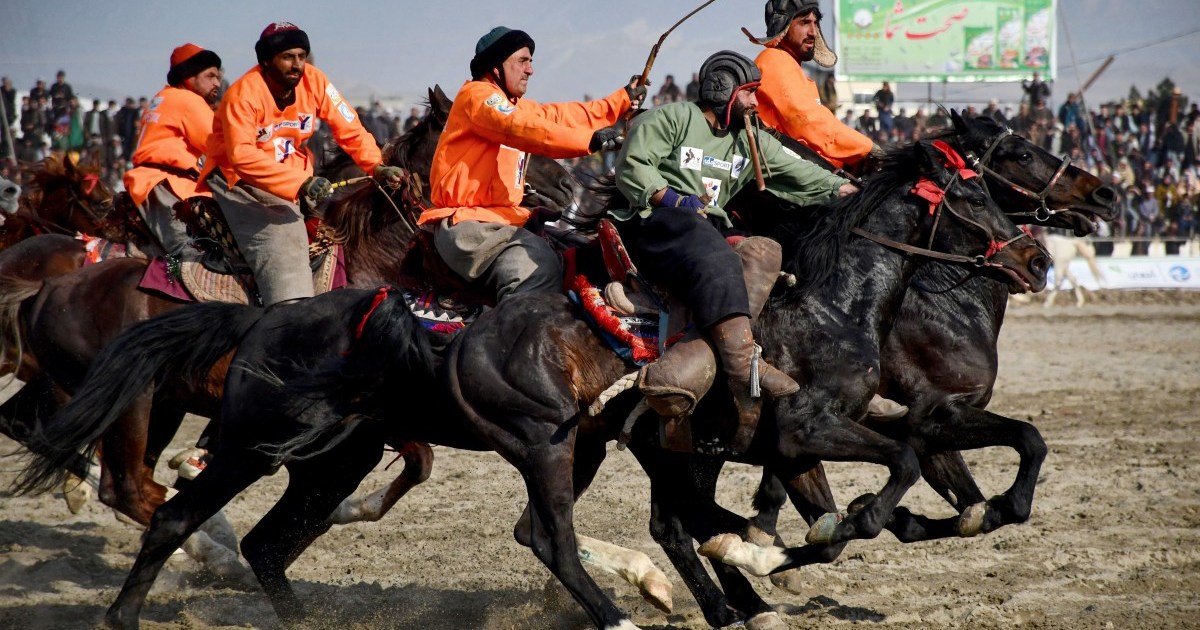
Afghan rider Sarwar Pahlawan blinked away pain from the new stitches between his eyes as his buzkashi team chased tournament victory. The ancient sport is still steeped in risk but now offers modern-day rewards.
Played for centuries on the country’s northern steppe, the national sport, sitting at the heart of Afghan identity, has evolved from a rough rural pastime to a professionalised phenomenon, flush with cash.
“The game has changed completely,” the horseman, soon to turn 40, said after returning home victorious from the tournament final in the northern city of Mazar-i-Sharif earlier this month.
After 20 years as a buzkashi rider, or “chapandaz”, Sarwar welcomes the changes to the game, which is played across Central Asia and features elements akin to polo and rugby.
“They used to pay us with rice, oil, a carpet or a cow,” he said, but today the chapandaz have professional contracts.
The best players can now earn $10,000 per year, with winning teammates sharing $35,000, three camels and a car offered by sponsors after clinching the title.
Traditionally, buzkashi is played with the headless body of a goat.
Today, more often a 30kg (66lb) leather sack stands in for the carcass that riders try to pull from a fray of horses and drop in a “circle of justice” traced on the ground after doing a lap of the arena at full gallop with competitors in hot pursuit.
Training has changed too as the national league’s top teams have evolved.
Robust horsemen no longer hang from trees or split wood to build muscle – they lift weights in gyms.
“Before, when we returned from a tournament, cold water was poured on our shoulders, now we have hammams [bath houses] and saunas,” said Sarwar, known as “the lion” for his strength.
Being one of the league’s best players has also filled Sarwar’s coffers.
“I didn’t even have a bike, and now I have a car. I had almost no sheep and now I have many. I had no house, and now I have two.”
But he says he remains “a simple man”. Between tournaments, he cultivates his land and raises his sheep.
Oil tycoon Saeed Karim, who splits his time between Mazar-i-Sharif, Dubai and Istanbul, is the biggest financier of the new buzkashi.
The Afghan businessman set up the winning team that bears his company’s name, Yama Petroleum, five months ago.
Karim acquired the best chapandaz in the country, including Sarwar, and around 40 competition horses, which can cost up to $100,000 each.
“In this team, we invested around a million dollars in horses, riders, stables and other equipment,” said Karim.
“I just want to serve my people,” he said. “When my team wins, it’s an honour for me.”
It can cost around $300,000 a year to take care of the team’s stallions, fed on barley, dates, carrots and fish oil, as well as 15 riders and 20 grooms.
For the comfort of his men – who commonly suffer broken ribs, fingers and legs – Karim had a 4-hectare 10-acre) ranch built for recuperation.
While Karim’s homeland in northern Afghanistan remains the centre of buzkashi in the country, the sport has made recent inroads in the south – the birthplace of the Taliban authorities who banned the sport between 1996 and 2001, but have allowed it since returning to power three years ago.
“Buzkashi is this nation’s passion,” the president of the Buzkashi Federation, Ghulam Sarwar Jalal, told AFP. “The Taliban know that it makes people happy, that’s why they authorise it.”
They also collect taxes from the professional league, started in 2020, which includes 13 teams from 10 provinces.
Likewise, some order has been brought into the brutal contests, and yellow or red cards rain down in the event of a foul.
Read More: World News | Entertainment News | Celeb News
Aljazera








